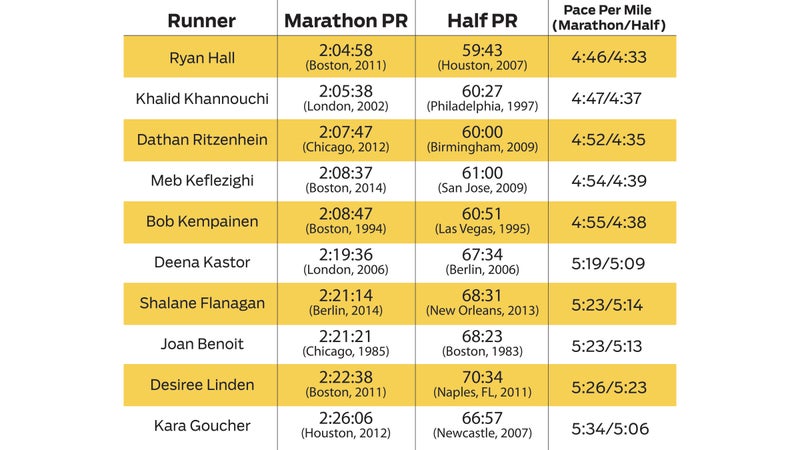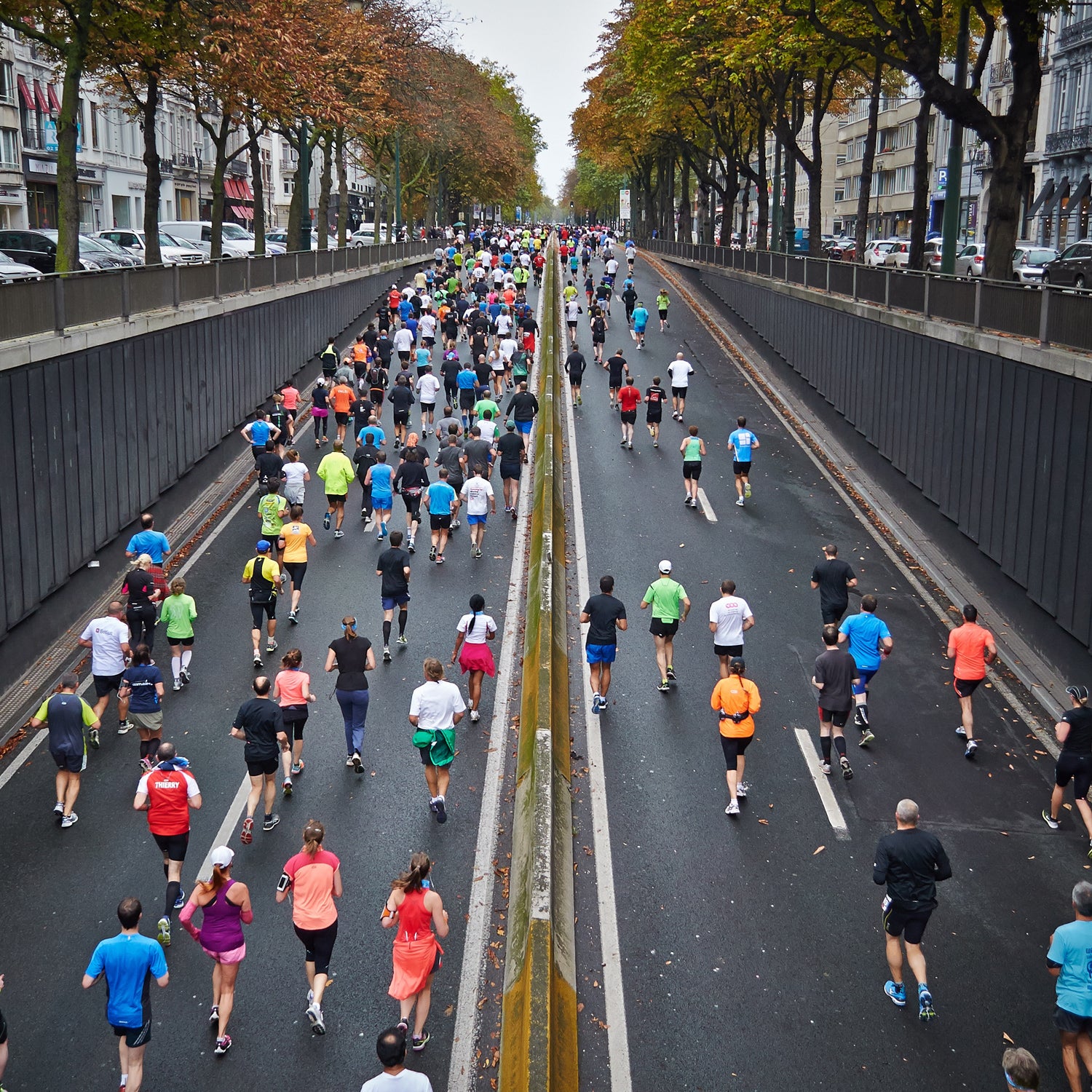Making the slothful among your Instagram followers feel worthless is great and all, but there’s another reason to do a half marathon. One of the more pragmatic “uses” of running 13.1 miles is that it can be a way to gauge your potential in the full marathon. This is true for first-timers, as well as seasoned veterans looking to run a fast 26.2 miles. The same thing holds in both cases: if you’re going to run a marathon to the best of your ability, you’ll want some prior indication of what you can sustain, pace-wise, over a longer distance. Because what feels easy and relaxed at 5K can feel like hell by mile 15 if you were too aggressive early on. And at that point, you’re pretty much screwed.
But is there a rule of thumb when it comes to determining an appropriate marathon pace based on one’s performance in a recent half?
To help shed some light on the subject, we might as well start at the top. Below is a chart comparing the half marathon and full marathon PRs of the top five men and women American marathon runners of all time, as well as the difference in pace per mile.

I’m aware that there’s only so much this chart can tell us. It’s but a tiny sample of super elite runners and in some cases, like Meb Keflezighi’s, athletes’ respective PRs are separated by several years, by which time they may have shifted the focus of their training or even changed physically. Also, since road race times are significantly impacted by course profiles, a half vs. full marathon comparison may be less illustrative than, say, juxtaposing 5,000- and 10,000-meter performances on the track. Indeed, IAAF course profile standards are why it is Khalid Khannouchi and not Ryan Hall who holds the official marathon record for American men (the Boston Marathon isn’t record eligible) and why Kara Goucher’s remarkable 66:57 half marathon is also not an American record (the effort garnered her a victory in the Great North Run, whose net downhill course is deemed too quick by the IAAF).
So the statistical relevance of this chart is unlikely to pass muster with the FiveThirtyEight folks.
Nevertheless, it offers a few illuminating takeaways. When looking at discrepancies between half and full marathon pace times, if we drop the outliers at both ends of the spectrum–i.e. Kara Goucher and Des Linden–the difference in pace-per-mile ranges between nine and seventeen seconds. Most interestingly, perhaps, is the way that a comparison between the PRs of Meb Keflezighi and Bob Kempainen mirrors that between Shalane Flanagan and Joan Benoit: in both cases half marathon and full marathon PRs fall within ten seconds of each other–a remarkable fact given the variables at play. (Extra credit goes to anyone who is nerdy enough to know that Bob Kempainen’s half marathon PR was set on a downhill, non-record-eligible course.)
If for elite athletes the difference in pace per mile between the half and full marathon ranges roughly between ten and twenty seconds, the difference is usually greater among amateurs. For example, in the 2014 “State of the Sport” report from Running USA, the median finish time for men running a half marathon in the United States was 2:01:37 (9:17 pace) and 4:16:37 (9:47 pace) for the full. When I asked Ben Rosario, who coaches both amateurs and the professional runners of Northern Arizona Elite, why this was the case, he suggested that the explanation might be as simple as running slower means running for a longer period of time, hence maintaining a similar pace effort becomes exponentially more challenging.
“It’s two very different things to race an event that takes two hours and ten minutes, as opposed to racing an event that takes four hours,” Rosario said.
“If the professional athletes were racing a race that took four hours, it would be quite a different effort as well.”
Viewed purely in terms of time spent running, in other words, pro athletes have a “shorter race” than slower amateurs, which could explain why they are able to run marathons at a clip more closely approximating their half marathon tempo. Just for kicks, consider that pro runner Max King, whose marathon PR is 2:14:36 (5:08 pace) won the 100K World Championships in 6:27:43 (6:14 pace).
But where does leave the vast majority of runners, the non Max Kings of the world?
“I would say a two hour half-marathoner, which is very average, would probably have to add about six minutes to their half marathon time and then multiply by two [to determine a projected full marathon time]. I haven’t done the statistical research, but I think that is what most pace calculators might tell you,” said Rosario.
The ballpark estimation of marathon potential is tricky, as it functions on a sliding scale, but most amateurs should expect a pace increase of between twenty and thirty seconds per mile when moving from the half marathon to the full. For those who are especially adept at longer distances, likely the freakishly talented Des Linden, the difference will be less.
“The real aerobic monsters, people who are just really physiologically gifted at the marathon distance and are training correctly, can add three to four minutes to their half marathon time and multiply it by two, and they can hit that, but those are the very best people,” Rosario said.
There’s a seductive appeal to having a formula to apply to your fastest half marathon time to help estimate what you can achieve in the full, but Rosario cautions against placing too much significance on the former. While a half marathon can be a useful fitness barometer and confidence booster, the marathon is still a different animal. Rather than a prediction tool, the half is probably best viewed as just another good workout.
“My advice for anyone who does a half marathon as a build-up is to see it in the big picture of the entire training block and where it fits. It’s just one more piece of the puzzle and it really shouldn’t hold any bigger value in your mind than any of the other workouts that you’re doing as you build towards the marathon. It should have its place, but it shouldn’t be over-dramatized,” Rosario says.
That may be good or bad news, depending on your last half marathon.


